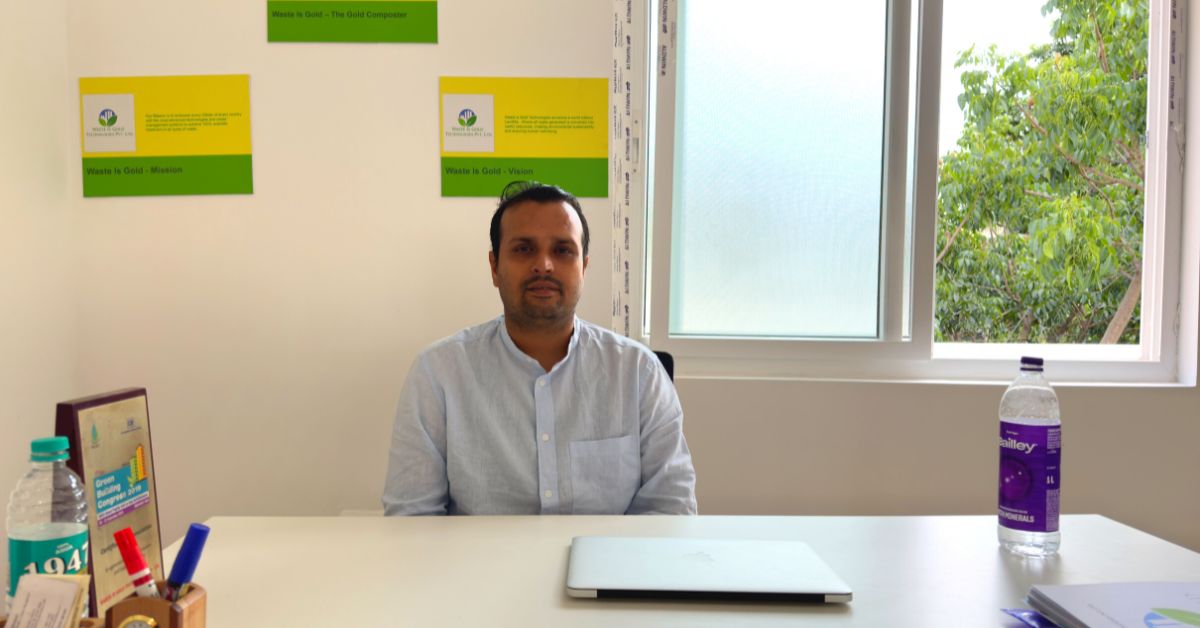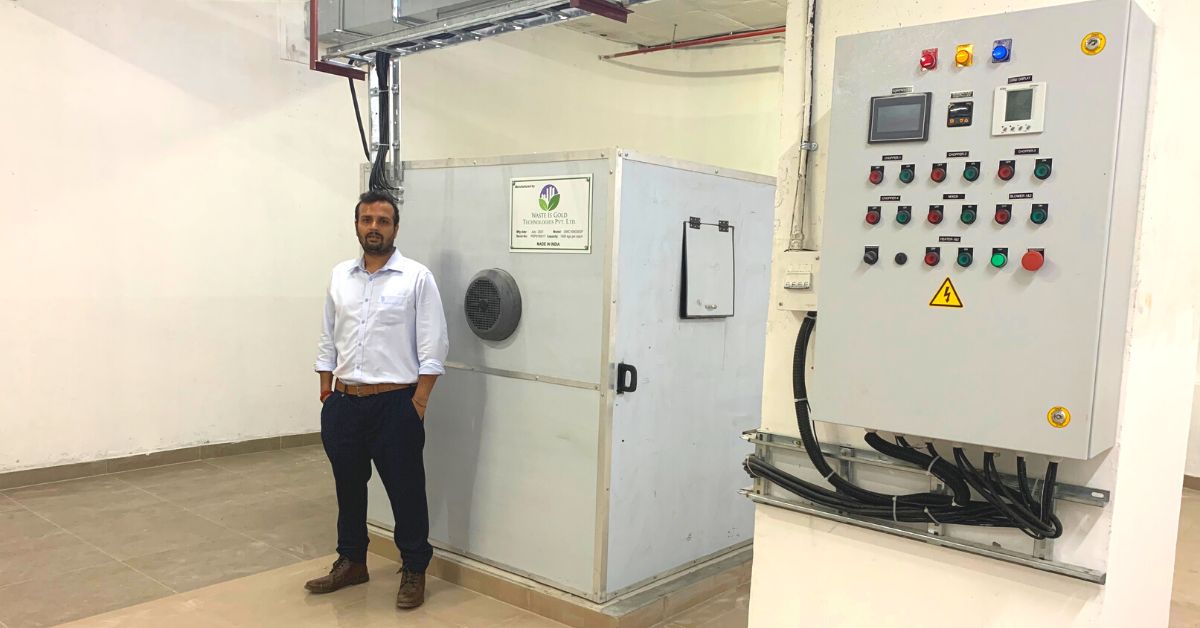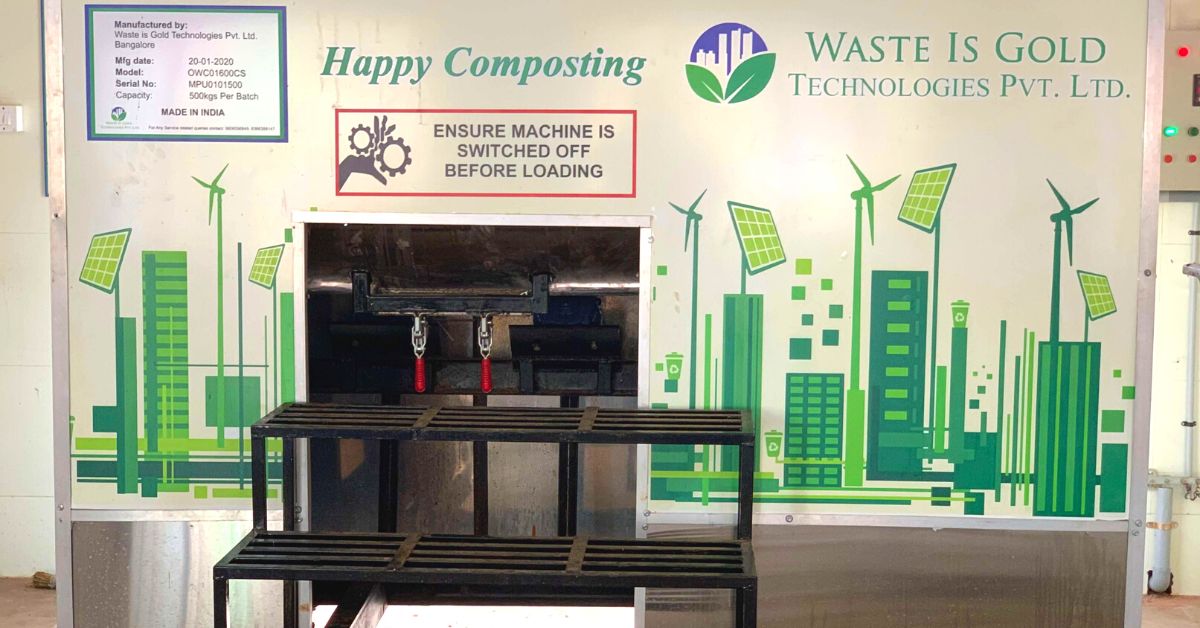As per government estimates dating back to 2021, India generates more than 62 million tonnes of Municipal Solid Waste (MSW), of which approximately 75-80% gets collected.
Of the amount of MSW collected, only about 22-28% is processed and treated. The rest ends up in landfills. Going further, up to half the MSW collected in India consists of “biodegradable (organic) matter” according to the Ministry of Housing and Urban Affairs.
Despite the scale of this problem, there are multiple ventures across different Indian cities arriving at different scalable solutions to treat organic MSW.
Similarly, ‘Waste Is Gold’, a Bengaluru-based waste management company, is one such venture which has arrived at a unique technological solution to address this pressing waste management concern.
Called the ‘Gold Composter’, their organic waste composter possesses an impressive capability of “seamlessly converting” waste amounting to anywhere between 20 kg to 10 tonnes into ‘nutrient-rich compost’ in just eight hours “without emitting harmful emissions”.
Sandeep Tiwari, founder of Waste Is Gold Technologies, calls the Gold Composter a “marvel of waste management technology”. Speaking to The Better India, he adds, “Our innovation doesn’t stop there. We have the expertise and versatility to design and implement large composters that can process hundreds of tons of organic waste in a single day as well.”

How Does It Work?
According to Tiwari, the Gold Composter is an advanced aerobic organic waste composter which “employs a completely natural bio-mechanical process, harnessing the power of our proprietary bacteria and bioreactor technology”.
“This approach breaks down organic waste rapidly, eliminating the need for excessive heating and ensuring that no harmful emissions like methane are released into the environment. This results in a composting process with a low carbon footprint. Operating on the principles of aerobic decomposition, this cutting-edge technology employs oxygen-consuming microorganisms and bio-reactor to accelerate the breakdown of organic matter,” he explains.
“This machine facilitates aerobic composting by meticulously maintaining the ideal temperature, air, oxygen, and moisture conditions, guaranteeing a fast and efficient transformation of organic waste. Our organic waste composter output requires no further processing. It can be directly placed into aerated crates for storage, ready for later use,” he adds.
For agricultural purposes, Tiwari recommends allowing the compost to fully mature for three to seven days after processing, ensuring it reaches its peak nutrient content.
“However, for landscaping and gardening needs, the compost can be utilised on the same day it’s produced, providing an instant boost to soil health. Our composter can treat a wide range of organic waste types — including cooked food waste, organic wet waste, bones, meat, feathers, eggshells, vegetable waste, tender coconut, horticulture waste, grass clippings, tissue paper, STP sludge and more.
From waste to compost
The Union government’s Solid Waste Management Policy 2016 mandates that bulk waste generators take responsibility for processing their waste right at their own premises.
“Our approach complements this policy seamlessly. By deploying our aerobic composter directly at our client’s premises, we empower bulk waste generators to comply with government directives. This not only eases the burden on landfills but also contributes to a cleaner environment. We stand as reliable partners for communities, organisations, urban local bodies and institutions in their journey towards responsible waste management practices and help them to reduce their carbon footprint,” claims Tiwari.
Before feeding organic waste into their Gold Composter, a crucial step in their process is the “meticulous resegregation” of waste.
“This ensures that no inorganic materials are present in the waste stream before it undergoes processing in our composter. This meticulous sorting not only optimises the efficiency of our composting process but also contributes to the quality of the nutrient-rich compost produced. As stated earlier, this compost can be utilised for landscaping and it can also be sold to farmers for organic farming practices. By closing the loop on organic waste, we promote sustainable waste management and foster a more eco-conscious and economically viable future,” he says.
This claim holds some water given that their waste composter was purchased by the Central Food Technological Research Institute for research and development and to set composting standards across India. Thus far, their composters have been installed across approximately 150 locations around the country processing about 2,500 tonnes of waste and generating 1,200 tonnes of compost per month. But none of these developments happened overnight.
It took around five years of extensive research and development before Waste Is Gold Technologies arrived at its flagship Gold Composter.
“Our journey began in 2014 marked by a spirit of experimentation and innovation. By 2015, we had successfully developed our first prototype, a pivotal milestone that spurred us to delve deeper into research and development to refine our product further. Our first prototype transformed waste into compost in 15 days without the need for any time-consuming curing process. This achievement set us apart from our competitors. At the time, they typically required a protracted 30 to 45 days to achieve the same results,” recalls Tiwari.
In January 2018, his venture took the next significant step by incorporating Waste Is Gold Technologies Pvt. Ltd. “We had developed around 10 prototypes before arriving at our Gold Composter. Later that year, we introduced the Gold Composter to the market. Still awaiting a patent, the Gold Composter ranks among the fastest organic waste processors in the world,” he claims.

How It Helps Citizens
Naveed Doddamani, deputy manager at Prestige Royal Gardens, a condominium complex located in Bengaluru notes, “We have two Gold Composters at Prestige Royal Gardens. On a daily basis, we process about 800 kg of organic waste.”
He adds, “Earlier, we were using another organic waste composter but it was emitting a strong smell. Recently, we began using the Gold Composter and have faced no issues while using them. The compost we generate is used for landscaping purposes on our property.”
Meanwhile, Deepak Setty, a senior manager overseeing procurement and contracts at Address Maker, a Bengaluru-based real estate company, says, “For each residential project, we require one organic waste composter and we do about two to three projects a year.”
“For about eight to nine years, we were going with another vendor. Once we began using their composters, however, we realised that there was a lot of methane getting released. Around three years ago, we approached Waste Is Gold Technologies. Their machines are working well and we’ve had no complaints so far,” he adds.
Explaining further how beneficial this switch between machines has been for them, Setty says, “What’s different about the Waste Is Gold composters is that they generate compost on the same day the organic waste is processed. In the machines we used earlier, it would take three days to generate that compost. The compost we’re generating is being used for landscaping purposes on our properties.”

Looking ahead
Currently, they are a bootstrapped venture but recognise the need for external funding.
“To further fuel our growth and expand the reach of our transformative products, we recognise the need to secure external investment. This strategic step will enable us to scale our operations, innovate more rapidly, and reach a wider audience, ultimately accelerating our impact on sustainable waste management,” says Tiwari.
Going further, he adds, “An exciting endeavour on the horizon is the launch of a portable composter specifically designed for individual villas and houses. This move aims to empower homeowners to actively participate in sustainable waste management practices.”
With more avenues to explore in this domain, Tiwari says, “We are also set to diversify our presence in various verticals within the waste management domain. Bio mining, a critical area of waste management, will be one of our focal points. Additionally, we’ll be venturing into dry waste management and processing.”
(Edited by Padmashree Pande; Images courtesy Waste Is Gold Technologies & OP Jindal Global University)
No comments:
Post a Comment